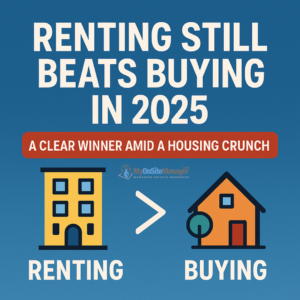As the U.S. housing market navigates through high mortgage rates, stubborn inflation, and limited housing inventory, a fresh analysis from Realtor.com reveals a striking truth: renting remains significantly more affordable than buying in 2025, especially for those eyeing starter homes in major cities.
According to the report, renting a typical home is now 60% cheaper on average than purchasing an equivalent starter home. That’s a monthly savings of about $1,027—a gap that has continued to grow over the past year, despite some markets experiencing rental slowdowns or slight home price dips.
The Homeownership Dream Hits a Wall
The American dream of owning a home is becoming increasingly elusive. While traditionally seen as a major milestone and investment in one’s future, the cost of buying has surged beyond the reach of many, particularly first-time buyers.
A combination of factors is driving this trend:
-
Mortgage Rates Near 7%: Even though inflation has cooled slightly, the Federal Reserve’s rate hikes in prior years continue to keep mortgage rates elevated. This directly increases the monthly payments for homebuyers.
-
High Home Prices: Inventory remains tight, and even modest homes have experienced steep price increases since the pandemic began. Starter homes—which are supposed to be more affordable—have seen disproportionate price appreciation.
-
Stagnant Wages: While housing costs have soared, wage growth has not kept pace, making it harder for Americans to qualify for loans or save for a down payment.
Renting Is More Affordable—Especially in Urban Areas
In 47 of the 50 largest metro areas in the U.S., renting is more cost-effective than buying. Among the top cities where the affordability gap is most dramatic are:
-
Austin, TX: The average monthly cost of buying is 136.3% higher than renting.
-
Seattle, WA: Buying costs 121.2% more than renting.
-
San Francisco, CA: A staggering 114.6% premium to own over renting.
-
Los Angeles, CA: Homebuyers pay 103.6% more monthly than renters.
These numbers indicate that for those living in competitive housing markets, the monthly financial burden of buying can be more than double the cost of renting.
The Case Against Starter Homes—For Now
One of the report’s biggest revelations is the growing unaffordability of so-called starter homes—properties that are supposed to be entry points into homeownership. Over the past few years, even these homes have become unattainable for many due to limited supply, high competition, and price surges.
Realtor.com’s report defines a starter home as a typical unit with 0-2 bedrooms. However, in today’s market, even these smaller properties come with outsized mortgage payments, making them impractical for many younger buyers, gig workers, and even middle-income earners.
Rent Isn’t Cheap Either—But It’s Still the Smarter Financial Choice
While rents have increased since the pandemic, the pace has slowed compared to the surge in mortgage and home prices. Renting still allows households to:
-
Avoid high upfront costs, like down payments, closing fees, and repairs.
-
Remain flexible, especially if job opportunities or life circumstances require relocation.
-
Manage predictable expenses, which can be crucial in uncertain economic times.
For the growing population of renters, especially Gen Z and Millennials, the decision to delay buying a home isn’t just about affordability—it’s a strategic financial choice.
What Renters Should Keep in Mind
Even though renting may be the better short-term option, long-term financial planning is still crucial. Consider the following:
-
Track rental increases and budget accordingly.
-
Maintain good credit—if market conditions improve, you’ll want to be ready to buy.
-
Explore alternative paths to homeownership, like co-buying, rent-to-own, or moving to more affordable metros.
Conclusion: Renting Is the Smart Move—for Now
In 2025, the housing market is still skewed against buyers, especially those looking for their first home. The cost gap between renting and buying is wider than ever, and in nearly every major U.S. city, renting offers more affordability, flexibility, and stability.
Unless there’s a dramatic shift in interest rates or housing supply, renting is likely to remain the more financially viable path for millions of Americans.
Source:Yahoo Finance: Renting Is Still More Affordable Than Buying in 2025

